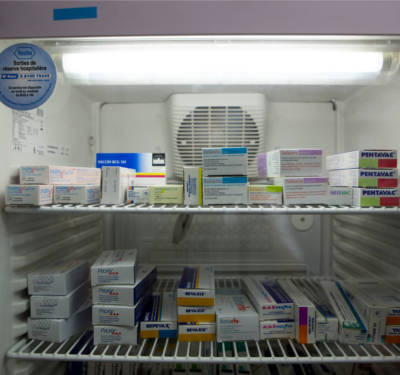Keeping Qatar’s vaccines cold
Training Qatar’s healthcare workers can lead to enhanced immunization effectiveness, say researchers.
Published online 31 December 2015

Vaccines most be kept at specific cold temperatures while transporting to maintain efficacy.
© © BSIP SA / Alamy Stock Photo
Immunization coverage in Qatar has improved significantly since 1979, when it introduced the World Health Organization’s (WHO) Expanded Program on Immunization. The country generally has high immunization coverage rates, but it has experienced small and recurrent outbreaks of some diseases, such as measles.
A study published in Global Local Health Perspectives is the first to examine the effectiveness of vaccine delivery in Qatar, say its author1. Researchers assessed how well primary healthcare centres maintained the storage temperature of vaccines according to WHO guidelines, known as “cold chain management”. They then conducted reassessments after healthcare workers received cold chain management training. “A reasonable and statistically significant improvement was found after the intervention,” says community medicine consultant Mohammed Al-Hajri from Qatar’s Supreme Council of Health.
In the study, 70 healthcare workers were randomly selected for a training of trainers’ workshop on cold chain management. These then trained an additional 500 healthcare workers from 21 primary health care centres (PHCCs). Pre- and post-training questionnaires were administered to assess changes in storage procedures.
The team found that all PHCCs they assessed used refrigerators solely for the storage of vaccines, placed refrigerators away from direct sunlight and closed refrigerator doors tightly; all positive practices. However, compliance to WHO cold chain management guidelines was not as strong in other areas. For example, refrigerators did not stand a proper distance away from the wall in several centres, four centres stored expired vaccines in their refrigerators and just under half the centres did not have a backup refrigerator, freezer or ice packs. These practices changed significantly after training. Other practices did not improve after training. For example, the six centres that did not have back-up generators before training had still not introduced them three months later.
The authors say cold chain management in Qatar generally complies with current immunization guidelines but that there is room for improvement. “We highly recommend that all healthcare professionals working in primary health care centres receive mandatory, regular cold chain management training. This will ensure delivery of the vaccines safely and effectively in Qatar,” says Al-Hajri.
One-off training courses on their own are not enough, he adds. The team is currently in the process of putting together a monitoring and continuing development program for all PHCCs in Qatar that will launch in January 2016. Their future research will be looking into factors that affect the stability of stored vaccines.
Reference
- Al-Hajri, M. M. et al. Status of cold chain management among health care providers in Qatar: Primary health care center based intervention study. Glob. Local Health Perspect. (2015). | article
DOI: 10.1038/qsh.2016.91

